THE MILL
Newsletter for Members and Friends of High Salvington Windmill March 2022
High Salvington Mill Trust has weathered the first two years of the Covid pandemic relatively well. While we lost all open day income in 2020 and a substantial portion of that income in 2021, the Trust was eligible for Covid recovery grants that made up most of that loss. Once we were able to open, the postponed events that we ran in 2021 were all very successful.
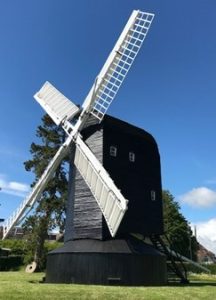 We took advantage of 2020’s downtime to completely repaint the mill buck, roundhouse and sweeps and the maintenance team has been in regular attendance keeping the grounds maintained and repainting the other buildings.
We took advantage of 2020’s downtime to completely repaint the mill buck, roundhouse and sweeps and the maintenance team has been in regular attendance keeping the grounds maintained and repainting the other buildings.
What government grants could not replace was the steady loss of volunteers as a growing number felt that after the pandemic break was the right time to hang up their miller’s caps and call it a day. Our summer fete in 2021 was renamed an “Open Fun Day” in response to our uncertainty as to how many volunteers would be available. We hope to go back to a full-scale fete in 2022.
To address the drop in volunteer numbers the Board had planned to hold a public meeting in 2021, but, in the face of the post-Christmas 2020 lock-down, this had to be postponed. We tentatively pencilled in the meeting for the following year, and on 21st January 2022, the meeting finally went ahead. Although St. Michael’s Church hall has a capacity for 90 people, we limited the advertising to mill gate posters and a circular to the residents’ association and local social media so that we could socially distance the attendees.
We had 60 people in attendance who were asked to fill in a volunteering preferences form. The Chairman presented a potted history of the mill and the role of volunteers in restoring it. Peter Casebow then introduced Dave Porter’s film, “Restoration of High Salvington Windmill”. We had a dozen or so existing volunteers fielding questions from the attendees and, from the meeting itself and phone calls before and afterwards, over fifty new volunteers came forward, along with a substantial influx of new members. Relevant names have been distributed to specific rota organisers and some of our newcomers have already visited the mill to help with pre-season cleaning.
We hope to welcome all of you to the Volunteers’ Coffee Morning on 20th March, starting at 10am, so that we can formally induct you and you can meet your organisers and other volunteers.
Volunteers meeting 20 March
All our volunteers are invited to the mill at 10:00 on 20th March for a hot drink, and an update and briefing for the season.
Maintenance report
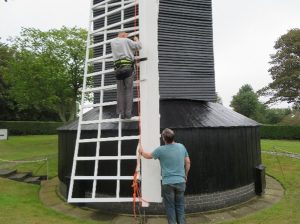 On 26th September, the maintenance team took down the sail cloths. Peter Casebow and Hazel Marsden took the opportunity to carry out a training session to introduce the new sail climbing safety system. Peter started with how to tie the reef knots to safely attach the safety rope to the fencing pins. After this, Adam, Greg and Matt were introduced to the new method for safely climbing the sails. This involves tying a climbing rope around the whip of one sweep, before rotating the sweeps 180° to tie off the other end around the opposing whip. A separate loop of cord is then looped around the rope in a “Prusik Loop”, A carabiner is attached to a safety harness that the sail climber wears which they use to attach to the prusik loop. Should they fall off the sweep they are climbing, the prusik loop will tighten and prevent a long fall. The canvas sail cloths were duly removed in the safest manner employed to date and spread out in the round house to dry off before being stowed away for the winter.
On 26th September, the maintenance team took down the sail cloths. Peter Casebow and Hazel Marsden took the opportunity to carry out a training session to introduce the new sail climbing safety system. Peter started with how to tie the reef knots to safely attach the safety rope to the fencing pins. After this, Adam, Greg and Matt were introduced to the new method for safely climbing the sails. This involves tying a climbing rope around the whip of one sweep, before rotating the sweeps 180° to tie off the other end around the opposing whip. A separate loop of cord is then looped around the rope in a “Prusik Loop”, A carabiner is attached to a safety harness that the sail climber wears which they use to attach to the prusik loop. Should they fall off the sweep they are climbing, the prusik loop will tighten and prevent a long fall. The canvas sail cloths were duly removed in the safest manner employed to date and spread out in the round house to dry off before being stowed away for the winter.
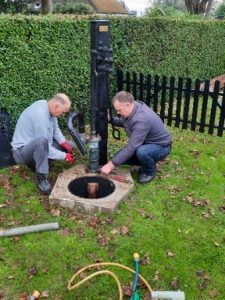 On 10th October, a small group of maintenance volunteers prepared the wind and village pumps for the winter. Water reservoirs were emptied, using a small, portable electric pump. Then, pumps were partly dismantled to remove water inside them before everything was reassembled. The village pump and Nutley wind engine both have additional valves to keep water in the pipes under normal operations so that they will commence delivering water immediately upon operation. The Glynde wind pump lacks this feature, which is why this machine always takes longer to start pumping water once the sails start to turn.
On 10th October, a small group of maintenance volunteers prepared the wind and village pumps for the winter. Water reservoirs were emptied, using a small, portable electric pump. Then, pumps were partly dismantled to remove water inside them before everything was reassembled. The village pump and Nutley wind engine both have additional valves to keep water in the pipes under normal operations so that they will commence delivering water immediately upon operation. The Glynde wind pump lacks this feature, which is why this machine always takes longer to start pumping water once the sails start to turn.
Founders Day 7th May
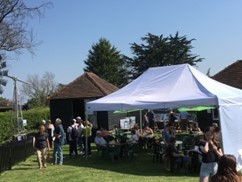 The Board decided to honour the founder members of the Trust at a special Saturday afternoon opening during the National Mills Weekend. The mill and the grounds will be open to the public on Saturday and Sunday afternoons May 7th and 8th. There will be a display and information to explain how the mill was restored and honouring some of our early volunteers and craftsmen who restored the mill in the 1970s and 1980s, as well as those who continue to maintain our wonderful windmill on the hill.
The Board decided to honour the founder members of the Trust at a special Saturday afternoon opening during the National Mills Weekend. The mill and the grounds will be open to the public on Saturday and Sunday afternoons May 7th and 8th. There will be a display and information to explain how the mill was restored and honouring some of our early volunteers and craftsmen who restored the mill in the 1970s and 1980s, as well as those who continue to maintain our wonderful windmill on the hill.
Do come up and view the exhibition, talk to the volunteers, and maybe take a guided tour inside. You are always sure of a warm welcome. The refreshment bar is open for tea, coffee, cakes, and ice-cream in hot weather. The shop sells souvenirs, including toy windmills to demonstrate how a windmill works.
Craft Fair 2022
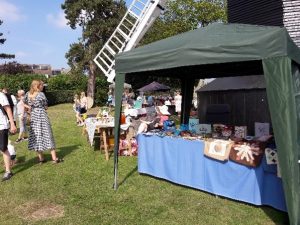 The annual Craft Fair is quite a different event these days from its origins many years ago. Initially it was started to encourage the use of traditional rural skills such as hedge laying and wood turning. Over the years it has changed as more and more crafters and other people who enjoy traditional skills such as jam making, mosaics and the like asked to become involved. In its modern guise the Craft Fair can have as many as thirty plus stalls ranging from the “Jam Lady” and the “cheese man” to pyrography (yes, writing with fire – also known as poker work), a good variety of craft exhibitors, mosaics, jewellery, handmade toys and cakes. We also still have some of the exhibitors who retain our links with the fair’s origins in the walking stick man (who also does a great line in Harry Potter type wands) and the traditional pole lathe, turning wood without any machinery. And our friends from Sompting Morris Dancers come and perform during the afternoon.
The annual Craft Fair is quite a different event these days from its origins many years ago. Initially it was started to encourage the use of traditional rural skills such as hedge laying and wood turning. Over the years it has changed as more and more crafters and other people who enjoy traditional skills such as jam making, mosaics and the like asked to become involved. In its modern guise the Craft Fair can have as many as thirty plus stalls ranging from the “Jam Lady” and the “cheese man” to pyrography (yes, writing with fire – also known as poker work), a good variety of craft exhibitors, mosaics, jewellery, handmade toys and cakes. We also still have some of the exhibitors who retain our links with the fair’s origins in the walking stick man (who also does a great line in Harry Potter type wands) and the traditional pole lathe, turning wood without any machinery. And our friends from Sompting Morris Dancers come and perform during the afternoon.
Whilst the Craft Fair is an important source of funds for the Mill, we still run it very much as a great day out for stallholders and visitors and to encourage people to keep traditional skills alive. So all that we ask from Stall holders at the Fair is a “donation based on sales”. So if you have a bad day then we understand and don’t ask for anything, taking some of the risk away and if you have a good day we are not greedy!!
So do come along on Sunday September 4th between 1 and 5 and see for yourself. The Mill is still open and, of course, there’s still our great selection of cakes to go with your cuppa. If you’re interested in having a table, ask early, it’s a popular event, contact Andy Campbell on 07710 144232 or andyrcampbell@btinternet.com. We look forward to seeing you there.
| Card Payments
Last season saw us able to take credit/debit card payments at the gate and in the tea-room. The pandemic seems to have accelerated a cashless society, and we were surprised by how many people now turn up without a single penny in their pockets. The app proved to be easy to use, and several of us have now trained in its use. Cashless payment does not extend to individual stalls at the fete. However, you will be able to purchase bags of cash with a card. Craft stall holders often have their own system. If you prefer to pay your membership dues by card, please go to our website. You can also pay your membership at the gate. Or fill in the form on page 5 and post to our membership secretary.
|
| Tell your friends about us
Would your family and friends like to join us and support the mill as a member? Members can come into open days free of charge by showing their card at the gate.
|
| The mill at night
|
The mills archive
The Mills archive contains a treasure trove of information about mills. I found this blog post published in February and I thought it would be of interest. I reproduce the blog post below, with permission from the mills archive.
An insight into one of our oldest books – ‘the Moolen-boek’
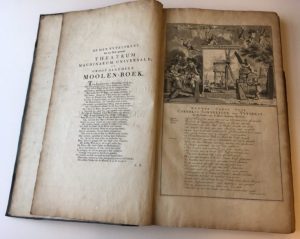 In our special collections here at the Mills Archive, we have an original copy of the Theatrum Machinarum Universale of Groot Algemeen Moolen-Boek, which translates as the Universal Theatre of Machines or Large General Mills Book, produced by Johannis van Zyl and Jan Schenk in 1734, and republished in 1761.
In our special collections here at the Mills Archive, we have an original copy of the Theatrum Machinarum Universale of Groot Algemeen Moolen-Boek, which translates as the Universal Theatre of Machines or Large General Mills Book, produced by Johannis van Zyl and Jan Schenk in 1734, and republished in 1761.
This large folio-sized book was produced as a reference book for millwrights and mill owners in the Netherlands. The book’s focus was on the mills that were located in Amsterdam. Johannis van Zyl was a mill maker (the literal translation of the word moolenmaker which features on the first page) from Lexmond, near Utrecht. Jan Schenk was the individual who engraved van Zyl’s drawings onto copper plate so they could be printed in the text. It is thought that Jan was a relative of the publisher of the piece, Petrus Schenk.
In the same year, another text similar to van Zyl’s appeared on the market. It was called the Groot Volkomen Moolenboek, which translates to the Big Perfect Mill Book, and was produced by Leendert van Natrus, Jacob Polly and Cornelius van Vuuren. We also hold a copy of this moolenboek at the archive. Both of the texts show how meticulous and detailed the craft of mill making, or millwrighting, was in the early 18th century. Prior to this, mill makers would work from experience and all mills were crafted differently and therefore the knowledge they had was unlikely to be put on paper. In addition, the craft of mill-making was very lucrative in the Netherlands in this period, and therefore mill-makers and their bosses had a vested interest in keeping the process of building wind- and watermills from being widely documented. This text sought to put an end to that, and portray the process of building a mill accurately and clearly.
Follow us on Facebook. Just look for High Salvington Windmill and “like” our page to see news about the mill and the planned events throughout the year.
| The entrance fee for non-member adults on open days, giving access to the grounds and the ability to purchase refreshments from our splendid tea bar, remains at £1, but we are now charging an additional £1 for adults wanting to go on a tour of the Mill. Accompanied children remain free of charge. Thank you for your continued support. |
 1 Stock image – not necessarily on sale 1 Stock image – not necessarily on sale
|
Fete 3 July
We hope that the fete will take place on Sunday 3rd July, but we are in need of a volunteer or volunteers to help coordinate the event. Graham Carthew has run it for several years now and wants to hand over the reins to someone else, though he is happy to support, advise and guide.
Membership
After many years of unchanged membership fees, the Mill has now decided that it needs to raise its subscriptions and prices. From this season, a single Annual membership will be £6 and £11 for a couple. Life membership will rise to £60. Annual membership rates have not changed for over 20 years, and we feel this still provides excellent value for money. You can use a credit card to pay on our website, or fill in the form below.
‘The Mill’ is edited by Lucy Brooks. 01903 691945. lucindafbrooks@outlook.com
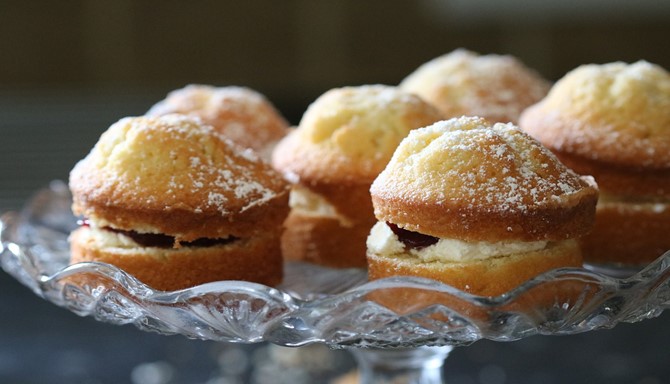
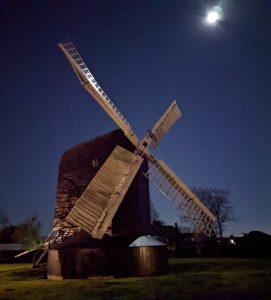 Thanks to Peter Hine for this image.
Thanks to Peter Hine for this image.